Jamie Sheffield's Blog, page 10
November 14, 2014
Seeing my writing from another person's point of view
I love talking with, or hearing from, people who have read my writing ... and not just to feed my massive ego either (although, to be honest, that's a part of it).
I love hearing about their experience with my words and thoughts and the people and place who live and exist in my stories.
 I am continually fascinated by the complex interplay between reader and writer and story. Having only switched from the reading side of the equation pretty recently, I am always fascinated by the way readers interface/interact with my stories, and to hear their reactions to the things that happen between the covers.
I am continually fascinated by the complex interplay between reader and writer and story. Having only switched from the reading side of the equation pretty recently, I am always fascinated by the way readers interface/interact with my stories, and to hear their reactions to the things that happen between the covers.
 I write to let the words and stories out, to share how I feel with the world (or at least the small portion of the world that reads my stuff), and to imagine worlds and people and problems that otherwise would only exist in my mind. In this manner, I get to experience life twice, but when talking with someone who has read my work, I get a third crack at life ... albeit from a slightly different angle.
I write to let the words and stories out, to share how I feel with the world (or at least the small portion of the world that reads my stuff), and to imagine worlds and people and problems that otherwise would only exist in my mind. In this manner, I get to experience life twice, but when talking with someone who has read my work, I get a third crack at life ... albeit from a slightly different angle.
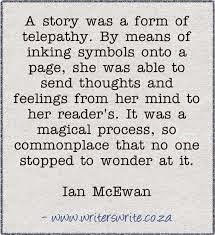 When you stop to think about it, reading and writing and the sharing of stories is magic, but it is so often seen that we take it for granted ... like the agility and grace and beauty of grey squirrels in the park.
When you stop to think about it, reading and writing and the sharing of stories is magic, but it is so often seen that we take it for granted ... like the agility and grace and beauty of grey squirrels in the park.
 I have a special feeling every time a piece of my writing is released into the world, knowing that whatever I had in mind for it, the story is now in the hands of readers who will experience it differently ... each of them from the others, and all of them from me.
I have a special feeling every time a piece of my writing is released into the world, knowing that whatever I had in mind for it, the story is now in the hands of readers who will experience it differently ... each of them from the others, and all of them from me.
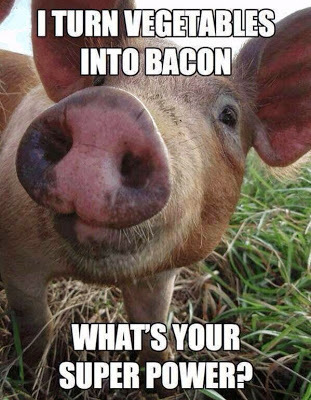
This morning, I listened to the first 20 minutes of my first novel, "Here Be Monsters" as an audiobook, and it felt entirely new to me (although I've read the book a number of times since first writing/publishing it). The voice talent is superb, and breathes a new and different life into the story with his spectacular reading of Tyler Cunningham's first full-length mystery.
This actor's superpower is to transport the audience (in this instance, just me, but in a few months, hopefully many more people as well, I hope) with his reading.
My superpower (and it's relatively unimportant how super it is) is to change thoughts into words, which can later be turned back into thoughts and dreams.
Your superpower, as reader (or listener), is to take the written (or spoken) word, and transform it into spectacular picture shows in your mind's eye.
Thanks,
Jamie
I love hearing about their experience with my words and thoughts and the people and place who live and exist in my stories.
 I am continually fascinated by the complex interplay between reader and writer and story. Having only switched from the reading side of the equation pretty recently, I am always fascinated by the way readers interface/interact with my stories, and to hear their reactions to the things that happen between the covers.
I am continually fascinated by the complex interplay between reader and writer and story. Having only switched from the reading side of the equation pretty recently, I am always fascinated by the way readers interface/interact with my stories, and to hear their reactions to the things that happen between the covers. I write to let the words and stories out, to share how I feel with the world (or at least the small portion of the world that reads my stuff), and to imagine worlds and people and problems that otherwise would only exist in my mind. In this manner, I get to experience life twice, but when talking with someone who has read my work, I get a third crack at life ... albeit from a slightly different angle.
I write to let the words and stories out, to share how I feel with the world (or at least the small portion of the world that reads my stuff), and to imagine worlds and people and problems that otherwise would only exist in my mind. In this manner, I get to experience life twice, but when talking with someone who has read my work, I get a third crack at life ... albeit from a slightly different angle. When you stop to think about it, reading and writing and the sharing of stories is magic, but it is so often seen that we take it for granted ... like the agility and grace and beauty of grey squirrels in the park.
When you stop to think about it, reading and writing and the sharing of stories is magic, but it is so often seen that we take it for granted ... like the agility and grace and beauty of grey squirrels in the park. I have a special feeling every time a piece of my writing is released into the world, knowing that whatever I had in mind for it, the story is now in the hands of readers who will experience it differently ... each of them from the others, and all of them from me.
I have a special feeling every time a piece of my writing is released into the world, knowing that whatever I had in mind for it, the story is now in the hands of readers who will experience it differently ... each of them from the others, and all of them from me.
This morning, I listened to the first 20 minutes of my first novel, "Here Be Monsters" as an audiobook, and it felt entirely new to me (although I've read the book a number of times since first writing/publishing it). The voice talent is superb, and breathes a new and different life into the story with his spectacular reading of Tyler Cunningham's first full-length mystery.
This actor's superpower is to transport the audience (in this instance, just me, but in a few months, hopefully many more people as well, I hope) with his reading.
My superpower (and it's relatively unimportant how super it is) is to change thoughts into words, which can later be turned back into thoughts and dreams.
Your superpower, as reader (or listener), is to take the written (or spoken) word, and transform it into spectacular picture shows in your mind's eye.
Thanks,
Jamie
Published on November 14, 2014 04:46
November 10, 2014
My 7 Rules for Writing
I finished writing and editing my third full-length novel this weekend, so it may well be time to throw my hat in the ring as regards a set of rules for writing.
In the last three years I've written and polished hundreds of thousands of words of fiction in novels, novellas, short stories, and poems; so I feel comfortable offering my rules for writing ... that is not to say that they'll work for you, but they have, and continue to work for me (so read on, or click elsewhere).

W. Somerset Maugham was at once right and wrong, joking and serious, in his assertion ... nevertheless, there are many lists of rules that have worked for great writers, and over the years I've come up with a similar set that seem to work for me.
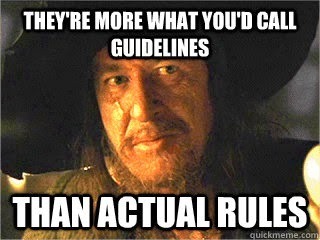
As the pirate said ... take anybody's rules, including (especially?) mine with as much salt as you feel will help your writing.
Rule #1: Read lots of great stuff
The biggest contributor to my being a writer is a lifetime of reading. I have always read anything that grabbed my eye, and make a point of reading everyday (I think this is more important than writing everyday). Fill your brain with great books and articles and novellas and poems and textbooks.
Rule #2: Write the kind of stories that you want to read
If you can picture yourself as a willing and enthusiastic audience for the stories you're writing, you're halfway to success (well, not really halfway, but it's a good start). Assuming that you're a lifelong and voracious and discriminating reader (see Rule#1, above), you'll have a good target audience.
Rule #3: Write fast, edit slow
I'm a big believer in writing a first draft as fast as you can, without worrying about getting it right the first time through. The first draft is telling the story to yourself (and your first reader). There will be plenty of time to take plenty of time when you are fixing and polishing the story in later drafts, but the first draft is a good place to hurry.
Rule #4: Keep your dialogue simple & direct & spare
What the characters are saying should carry the dialogue in your writing, not how the writer says it ... to that end, you should generally use 'said' when characters said something, and try not to modify 'said' with an adverb describing how they said something (let what they said speak for itself).
Rule #5: When in doubt, use less description
I think nothing bogs a good (or even a great) story down like too much detail. It's important for you, as the writer, to know everything about the scene, setting, and every single character in the story ... but it's your job not to burden readers with all of those details; only the ones absolutely needed to advance the story.
Rule #6: Trust your beta reader ... and yourself
When the first draft is finished, give it to someone you respect and trust (and think is at least as smart as you are) to read. They'll be able to see through the crapiness of your rough work to the framework/skeleton of your story. Trust them to know what works and what doesn't, what you need to expand and prune and move/graft; just don't trust them to know how to fix it ... that's your job, and is author-magic.
Rule #7: Work hard at writing, but know when to walk away from the table
Writing fiction is hard work ... anyone who tells you otherwise is promoting their course or book or simply hasn't done it. The way you become a better writer is to write and write and write. The flip side of that is knowing, as a writer, when you are heading towards burnout and brain-melt ... that's the time to take the dogs for a walk, watch a movie with your kid, start a new book/article, or go camping for a couple of days.
Bonus Material!!!
Rule #8: Start, keep writing, and finish your writing
Rule #8 is a combination of the previous seven rules, but is worth mentioning anyway ....

My rules for writing can help you produce a great book, but only if you start, keep writing, and push through to finish your book.
You have to be willing to take a chance on making a fool of yourself, writing crap, and disappointing your mom ... if you can live with those things, and just keep putting one word after another, you'll eventually get to:
THE END
In the last three years I've written and polished hundreds of thousands of words of fiction in novels, novellas, short stories, and poems; so I feel comfortable offering my rules for writing ... that is not to say that they'll work for you, but they have, and continue to work for me (so read on, or click elsewhere).

W. Somerset Maugham was at once right and wrong, joking and serious, in his assertion ... nevertheless, there are many lists of rules that have worked for great writers, and over the years I've come up with a similar set that seem to work for me.

As the pirate said ... take anybody's rules, including (especially?) mine with as much salt as you feel will help your writing.
Rule #1: Read lots of great stuff
The biggest contributor to my being a writer is a lifetime of reading. I have always read anything that grabbed my eye, and make a point of reading everyday (I think this is more important than writing everyday). Fill your brain with great books and articles and novellas and poems and textbooks.
Rule #2: Write the kind of stories that you want to read
If you can picture yourself as a willing and enthusiastic audience for the stories you're writing, you're halfway to success (well, not really halfway, but it's a good start). Assuming that you're a lifelong and voracious and discriminating reader (see Rule#1, above), you'll have a good target audience.
Rule #3: Write fast, edit slow
I'm a big believer in writing a first draft as fast as you can, without worrying about getting it right the first time through. The first draft is telling the story to yourself (and your first reader). There will be plenty of time to take plenty of time when you are fixing and polishing the story in later drafts, but the first draft is a good place to hurry.
Rule #4: Keep your dialogue simple & direct & spare
What the characters are saying should carry the dialogue in your writing, not how the writer says it ... to that end, you should generally use 'said' when characters said something, and try not to modify 'said' with an adverb describing how they said something (let what they said speak for itself).
Rule #5: When in doubt, use less description
I think nothing bogs a good (or even a great) story down like too much detail. It's important for you, as the writer, to know everything about the scene, setting, and every single character in the story ... but it's your job not to burden readers with all of those details; only the ones absolutely needed to advance the story.
Rule #6: Trust your beta reader ... and yourself
When the first draft is finished, give it to someone you respect and trust (and think is at least as smart as you are) to read. They'll be able to see through the crapiness of your rough work to the framework/skeleton of your story. Trust them to know what works and what doesn't, what you need to expand and prune and move/graft; just don't trust them to know how to fix it ... that's your job, and is author-magic.
Rule #7: Work hard at writing, but know when to walk away from the table
Writing fiction is hard work ... anyone who tells you otherwise is promoting their course or book or simply hasn't done it. The way you become a better writer is to write and write and write. The flip side of that is knowing, as a writer, when you are heading towards burnout and brain-melt ... that's the time to take the dogs for a walk, watch a movie with your kid, start a new book/article, or go camping for a couple of days.
Bonus Material!!!
Rule #8: Start, keep writing, and finish your writing
Rule #8 is a combination of the previous seven rules, but is worth mentioning anyway ....

My rules for writing can help you produce a great book, but only if you start, keep writing, and push through to finish your book.
You have to be willing to take a chance on making a fool of yourself, writing crap, and disappointing your mom ... if you can live with those things, and just keep putting one word after another, you'll eventually get to:
THE END
Published on November 10, 2014 02:00
November 4, 2014
9 Super Ways to Jumpstart Your Writing!
Everybody, every writer, has days (or weeks ... sometimes months) when the words and ideas just don't want to come, or flow. A sane person might take this as a sign that they should find some other calling, but writers are driven to get past the slump/block/lull.
I have a bunch of tricks that I use to force myself through the tough stretches, and figured that roughly a week into NaNoWriMo is the perfect time to share them. Explore, enjoy, and feel free to ignore any of them that either don't work for you, or don't appeal (although why not give it a shot, if I you're bogged down).

If I can't write something worth reading, I try to get up and out and do something worth writing about ... a walk in the woods with my dogs, a paddle on a quiet pond with my son, winter-camping with friends, or exploring a ghost-town with dogs/boy/buddies ... all of these make worthwhile breaks from failing at writing, as well as providing good fodder for future fiction.

I have an idea book, and also an app on my iPhone, and I try to have one or both of them with me wherever I go (and whatever I do), just in case an idea strikes and I (wisely) decide not to trust myself to remember it.
I also use them for journaling when I'm having trouble getting my writing started ... this may seem funny (it does to me, and it's me), that I write to help my writing when I can't write, but it's true. I start by writing about my day, my plans for the weekend, the shopping list for recipes that I want to try, and before long a creative thought wanders into my brain and (sometimes) onto the paper, priming the pump for less list-y writing.

I'm generally too much the introvert to be much good in/at face-to-face creative writing classes, but I do enjoy finding this sort of group online, and spend a fair amount of time talking with the people in them for the simple reason that they're crazy in many of the same ways that I am. Sharing my thoughts and problems and hopes and dreams and ideas and plans with a population in similar circumstances is a great way to keep my writing output 'regular' and/or act as a healthy dose of creative-writing fiber (to push the metaphor just slightly too far) to get my head/writing unplugged.

If your significant other comes home, or your parents call, and they find you asleep on the couch, feel free to tell them that I said it was OK ... it won't help, but might give you time to think of something better to say.
I often find that if I run into a roadblock in my writing, that taking a break, sometimes in the form of a short nap, gives the minions in the back of my head the time they needed to figure things out ... this will often allow me to start writing again much more productively than I could have before my nap.
I don't think that it has anything to do with being tired, but is much more about focus and relaxation in problem-solving.
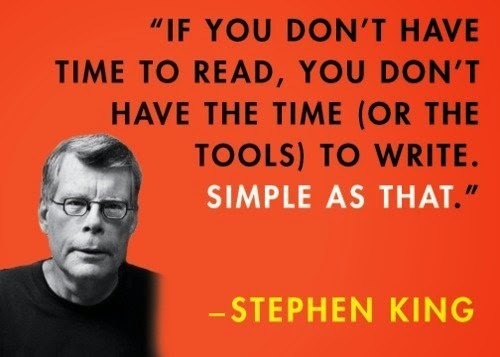
When all else fails, I read. Reading has been a constant source of comfort and refuge and inspiration for me, since long before I became a writer. I generally have a number of books going at any one time, and switch back and forth between them as the mood strikes me.
Besides offering your brain a chance to disconnect from the stress of creative output, reading also (hopefully) provides good exemplars for the sort of work you'll focus on once you're done reading.

I drink coffee when I write ... lots of coffee. I don't do this because I'm tired, lacking sleep, or need to wake up; I do it because the stimulation, the altered state of my consciousness, helps my writing process.
If the flow of my writing is blocked or slow, I generally stop to stretch and make another cup of coffee (maybe two).
I have worked over the years to perfect the proper level of caffeination ... too little and the words stumble over my conscious self on the way out of my brain, too much, and I'm jittery and the writing comes out fast and loose and messy.
I will switch to Coca-Cola on hot days, although the sweetness bothers me in the quantities I like/need to drink.
Sometimes during extreme word-stoppages or when I'm almost done with writing for the day I adulterate my coffee (or coke) with bourbon, which gives both my writing and my caffeinated beverage an interesting flavor.
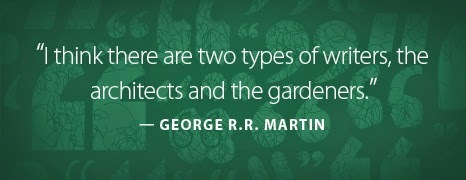
Writers tend to spend most of their time in one camp of the other when it comes to pre-writing and organization ... I'm an architect, a planner, I like working off of a general plan or roadmap. When I get stuck or stopped in my writing, though, I will often take a hard turn off the map and into the unknown.
The shift will generally jog whatever was jammed loose, and eventually allow me to get back to the story I had planned to tell. Similarly, I would recommend that someone who tends to write by the seat of their pants, but finds themselves temporarily without either seat or pants should try laying out the next few scenes that they want to write in meticulous detail ... whether or not you/they follow through is unimportant, when compared to the hoped-for benefit to your writing of the forced shift in procedure.
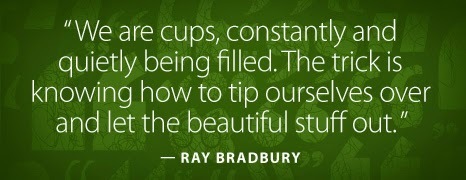
During the last few years of writing, I've found a couple of tricks that work for me to help 'tip myself over and let the beautiful stuff out' (as Ray Bradbury puts it). I noticed them working by accident, and while these particular ones may or may not work for you, if you pay attention over time, you'll learn the things that let you tip yourself over.
Going for a drive the window open enough to fill my car with the smell of the world passing by is one. Another is walking with a camera in my hand, looking for pretty things to take pictures of. Experimental cooking (exploring new/weird foods/flavors from the market or the depths of my pantry) also seems to tweak whatever is needed to jostle my brain enough to let spill some of the good stuff when creative writing is tough to do.

The tips above mostly deal with things that I do (to) myself in order to get things moving in a creative sense, but sometimes I can take a hand in things by forcing a change in the story I'm working on.
Everyone knows that 'bad decisions make good stories', but perhaps even more important and interesting is the lesson learned from (or at least offered in) the quote above.
Have a character in your story exhibit bad (even horrific) judgment in some instance that takes place within or outside of the context of your story. The events surrounding their poor judgment will often make for an interesting sidebar, and may even help you understand/form/develop the character (and/or your story) in ways you hadn't imagined previously.
I hope that these tips can help you to climb out of a writing slump, and to keep pushing through to your writing goals for the day/week/month/year!
Thanks,
Jamie
I have a bunch of tricks that I use to force myself through the tough stretches, and figured that roughly a week into NaNoWriMo is the perfect time to share them. Explore, enjoy, and feel free to ignore any of them that either don't work for you, or don't appeal (although why not give it a shot, if I you're bogged down).

If I can't write something worth reading, I try to get up and out and do something worth writing about ... a walk in the woods with my dogs, a paddle on a quiet pond with my son, winter-camping with friends, or exploring a ghost-town with dogs/boy/buddies ... all of these make worthwhile breaks from failing at writing, as well as providing good fodder for future fiction.

I have an idea book, and also an app on my iPhone, and I try to have one or both of them with me wherever I go (and whatever I do), just in case an idea strikes and I (wisely) decide not to trust myself to remember it.
I also use them for journaling when I'm having trouble getting my writing started ... this may seem funny (it does to me, and it's me), that I write to help my writing when I can't write, but it's true. I start by writing about my day, my plans for the weekend, the shopping list for recipes that I want to try, and before long a creative thought wanders into my brain and (sometimes) onto the paper, priming the pump for less list-y writing.

I'm generally too much the introvert to be much good in/at face-to-face creative writing classes, but I do enjoy finding this sort of group online, and spend a fair amount of time talking with the people in them for the simple reason that they're crazy in many of the same ways that I am. Sharing my thoughts and problems and hopes and dreams and ideas and plans with a population in similar circumstances is a great way to keep my writing output 'regular' and/or act as a healthy dose of creative-writing fiber (to push the metaphor just slightly too far) to get my head/writing unplugged.

If your significant other comes home, or your parents call, and they find you asleep on the couch, feel free to tell them that I said it was OK ... it won't help, but might give you time to think of something better to say.
I often find that if I run into a roadblock in my writing, that taking a break, sometimes in the form of a short nap, gives the minions in the back of my head the time they needed to figure things out ... this will often allow me to start writing again much more productively than I could have before my nap.
I don't think that it has anything to do with being tired, but is much more about focus and relaxation in problem-solving.

When all else fails, I read. Reading has been a constant source of comfort and refuge and inspiration for me, since long before I became a writer. I generally have a number of books going at any one time, and switch back and forth between them as the mood strikes me.
Besides offering your brain a chance to disconnect from the stress of creative output, reading also (hopefully) provides good exemplars for the sort of work you'll focus on once you're done reading.

I drink coffee when I write ... lots of coffee. I don't do this because I'm tired, lacking sleep, or need to wake up; I do it because the stimulation, the altered state of my consciousness, helps my writing process.
If the flow of my writing is blocked or slow, I generally stop to stretch and make another cup of coffee (maybe two).
I have worked over the years to perfect the proper level of caffeination ... too little and the words stumble over my conscious self on the way out of my brain, too much, and I'm jittery and the writing comes out fast and loose and messy.
I will switch to Coca-Cola on hot days, although the sweetness bothers me in the quantities I like/need to drink.
Sometimes during extreme word-stoppages or when I'm almost done with writing for the day I adulterate my coffee (or coke) with bourbon, which gives both my writing and my caffeinated beverage an interesting flavor.

Writers tend to spend most of their time in one camp of the other when it comes to pre-writing and organization ... I'm an architect, a planner, I like working off of a general plan or roadmap. When I get stuck or stopped in my writing, though, I will often take a hard turn off the map and into the unknown.
The shift will generally jog whatever was jammed loose, and eventually allow me to get back to the story I had planned to tell. Similarly, I would recommend that someone who tends to write by the seat of their pants, but finds themselves temporarily without either seat or pants should try laying out the next few scenes that they want to write in meticulous detail ... whether or not you/they follow through is unimportant, when compared to the hoped-for benefit to your writing of the forced shift in procedure.

During the last few years of writing, I've found a couple of tricks that work for me to help 'tip myself over and let the beautiful stuff out' (as Ray Bradbury puts it). I noticed them working by accident, and while these particular ones may or may not work for you, if you pay attention over time, you'll learn the things that let you tip yourself over.
Going for a drive the window open enough to fill my car with the smell of the world passing by is one. Another is walking with a camera in my hand, looking for pretty things to take pictures of. Experimental cooking (exploring new/weird foods/flavors from the market or the depths of my pantry) also seems to tweak whatever is needed to jostle my brain enough to let spill some of the good stuff when creative writing is tough to do.

The tips above mostly deal with things that I do (to) myself in order to get things moving in a creative sense, but sometimes I can take a hand in things by forcing a change in the story I'm working on.
Everyone knows that 'bad decisions make good stories', but perhaps even more important and interesting is the lesson learned from (or at least offered in) the quote above.
Have a character in your story exhibit bad (even horrific) judgment in some instance that takes place within or outside of the context of your story. The events surrounding their poor judgment will often make for an interesting sidebar, and may even help you understand/form/develop the character (and/or your story) in ways you hadn't imagined previously.
I hope that these tips can help you to climb out of a writing slump, and to keep pushing through to your writing goals for the day/week/month/year!
Thanks,
Jamie
Published on November 04, 2014 04:21
October 30, 2014
13 ways that continuously writing continuously changes you
Writing three novels, four novellas, and a fair amount of shorter material in the last three years has changed my life, my outlook, and my world; my writing has changed, improved, no doubt, but there's much more to it than that ... the process of writing so much and so often has affected significant changes in who I am, and how I interact with the world.
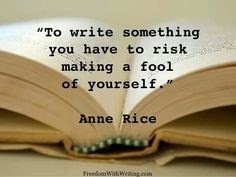
To become a writer, you have to shed the fear of exposing yourself to ridicule (at least partly). Working on lots of different creative projects, and sharing them with the world forces you to relax when it comes to fearing the judgement of others.

When you make a habit of writing, your brain and outlook alters. I was terrified of not being able to produce a full-length novel at the beginning of my first NaNoWriMo, but now am fearful of not having enough writing time for all of the ideas vying for space in my head.
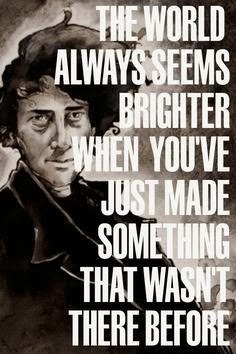
Time is fleeting, the life of a man is short, but something you've written can be around forever (as long as people keep reading); there's a magical glow that I feel whenever I finish a project ... and the desire to start the next one (and the next, after that).
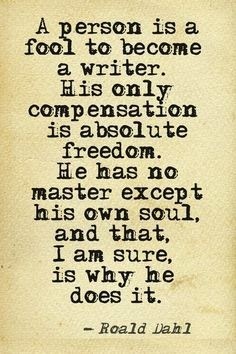
I am reasonably sure that I haven't sent my books around to agents and publishers because I enjoy the freedom of being an independent author and publisher. I write what I want, when I want, and how I want. Doing this for days and weeks and months and years is cumulatively empowering in a way that I love and cherish.
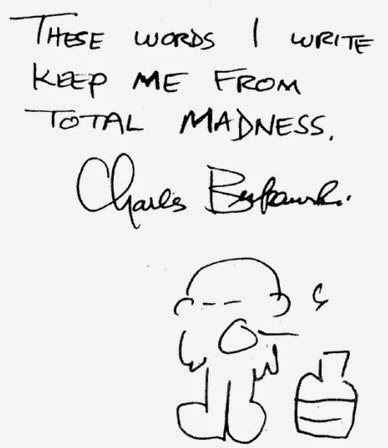
The longer I write, the more I recognize writing as therapy ... at least for me. The things I'm stressed by, worried about, bothered because of, all seem less important when I can exorcise them through writing, and explore their greater meaning on the page.

I came across this idea of Hemingway's one day, and fell in love with it instantly. I can feel my writing get better, stronger, faster, and more precise (to finally climb away from Steve Austin-ish language) with each day, each page, I write, but there's a freedom in knowing that there's no final stopping point when I'll be good enough ... I look forward to my writing improving until the day that I can no longer put pen to paper, or fingers to keyboard.

I used to be careful about what I said and thought and wrote, but the more that I write, the more I enjoy exploring subjects and people that scare and intimidate and fascinate me; cracking a topic or a new and interesting character open in front of the world (or simply in my writing journals/exercises) takes the power away from it/them, and gives it back to me.

Writing all the time forces your brain to grow in seemingly disparate ways, simultaneously. As your comfort with writing grows, you find yourself more easily able to embrace the apparent contradiction of the free flow of ideas in an organized manner ... of relaxing while concentrating, of giving your sub-conscious free rein while maintaining structure on a conscious level, of precisely controlled chaos. It's an exquisite feeling, and one of the great gifts a frequent writer gives to himself,

Over the years of writing, I've grown more than comfortable with the idea of walking through this world with multiple occupants in my head. Some of them characters in my books, others are just voices and opinions that rattle around in there; I like having all of them inside of, and contributing to, me. Bits and pieces of some of them end up in my stories, others never get out of my skull except for the exercise-yard of the occasional writing prompt. Over time though, my writing has rendered me more comfortable with all of them (what I think of as my extended, internal, family). ;)
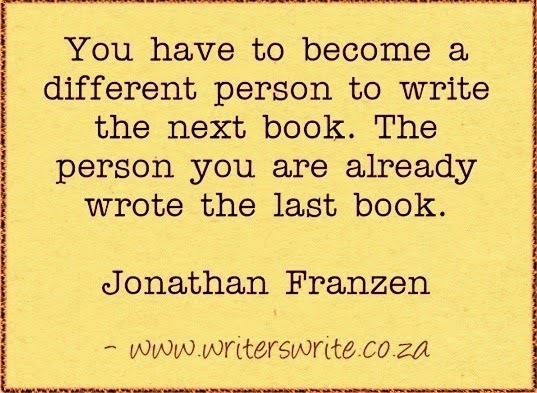
Related to some of the items mentioned above, but there's something additional, worth noting, that happens with frequent and repeated and longterm writing ... I have found that while I still enjoy my earlier works, I couldn't write them now. I've grown and changed in the process of writing hundreds of thousands of words, and my writing and thinking and worldview aren't those of the person who wrote my earlier works any longer. I cherish this concrete (to me) evidence of change over time.
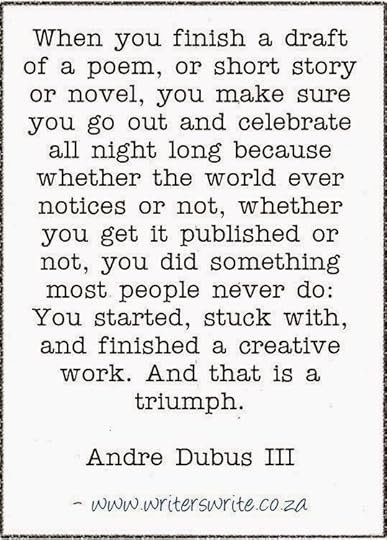
Writing is a hard and lonely and tiring and boring and stressful process, and if you're able to complete your writing projects, particularly again and again and again, you're doing something remarkable ... something that deserves celebration and notice. It took me years to comfortably accept this idea, and now that I've finally embraced this idea, I've been able to extend it to other things and people in my life ... finding reasons to celebrate peoples' unique and exciting achievements.

The goal of writing my first novel was important to me personally, but not in any greater sense (either to me, or the world at large), but the fact that I was able to complete writing the rough draft in a month was magical on a number of levels. It gave me, and it will give you, the power that comes from the knowledge that you have set, and met, seriously challenging goals for yourself, and that you can go on to bigger and better and greater things form there..
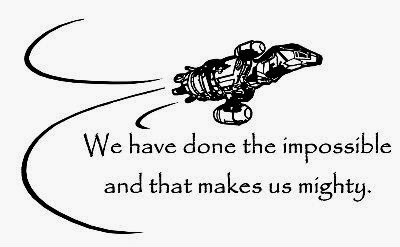
Doing 'the impossible' (which writing and publishing multiple pieces of work over a number of years, while maintaining most of your sanity, arguably is) has a cumulative and ongoing effect, in that you aren't scared to reach ... even, possibly particularly, reaching for beyond-rational goals. The fear of failure diminishes, and without that fear, you are able to do greater and greater things (you may fail occasionally, but so what? People fail at things all the time ... how wonderful a luxury to fail at something spectacularly).
Thanks,
Jamie

To become a writer, you have to shed the fear of exposing yourself to ridicule (at least partly). Working on lots of different creative projects, and sharing them with the world forces you to relax when it comes to fearing the judgement of others.

When you make a habit of writing, your brain and outlook alters. I was terrified of not being able to produce a full-length novel at the beginning of my first NaNoWriMo, but now am fearful of not having enough writing time for all of the ideas vying for space in my head.

Time is fleeting, the life of a man is short, but something you've written can be around forever (as long as people keep reading); there's a magical glow that I feel whenever I finish a project ... and the desire to start the next one (and the next, after that).

I am reasonably sure that I haven't sent my books around to agents and publishers because I enjoy the freedom of being an independent author and publisher. I write what I want, when I want, and how I want. Doing this for days and weeks and months and years is cumulatively empowering in a way that I love and cherish.

The longer I write, the more I recognize writing as therapy ... at least for me. The things I'm stressed by, worried about, bothered because of, all seem less important when I can exorcise them through writing, and explore their greater meaning on the page.

I came across this idea of Hemingway's one day, and fell in love with it instantly. I can feel my writing get better, stronger, faster, and more precise (to finally climb away from Steve Austin-ish language) with each day, each page, I write, but there's a freedom in knowing that there's no final stopping point when I'll be good enough ... I look forward to my writing improving until the day that I can no longer put pen to paper, or fingers to keyboard.

I used to be careful about what I said and thought and wrote, but the more that I write, the more I enjoy exploring subjects and people that scare and intimidate and fascinate me; cracking a topic or a new and interesting character open in front of the world (or simply in my writing journals/exercises) takes the power away from it/them, and gives it back to me.

Writing all the time forces your brain to grow in seemingly disparate ways, simultaneously. As your comfort with writing grows, you find yourself more easily able to embrace the apparent contradiction of the free flow of ideas in an organized manner ... of relaxing while concentrating, of giving your sub-conscious free rein while maintaining structure on a conscious level, of precisely controlled chaos. It's an exquisite feeling, and one of the great gifts a frequent writer gives to himself,

Over the years of writing, I've grown more than comfortable with the idea of walking through this world with multiple occupants in my head. Some of them characters in my books, others are just voices and opinions that rattle around in there; I like having all of them inside of, and contributing to, me. Bits and pieces of some of them end up in my stories, others never get out of my skull except for the exercise-yard of the occasional writing prompt. Over time though, my writing has rendered me more comfortable with all of them (what I think of as my extended, internal, family). ;)

Related to some of the items mentioned above, but there's something additional, worth noting, that happens with frequent and repeated and longterm writing ... I have found that while I still enjoy my earlier works, I couldn't write them now. I've grown and changed in the process of writing hundreds of thousands of words, and my writing and thinking and worldview aren't those of the person who wrote my earlier works any longer. I cherish this concrete (to me) evidence of change over time.

Writing is a hard and lonely and tiring and boring and stressful process, and if you're able to complete your writing projects, particularly again and again and again, you're doing something remarkable ... something that deserves celebration and notice. It took me years to comfortably accept this idea, and now that I've finally embraced this idea, I've been able to extend it to other things and people in my life ... finding reasons to celebrate peoples' unique and exciting achievements.

The goal of writing my first novel was important to me personally, but not in any greater sense (either to me, or the world at large), but the fact that I was able to complete writing the rough draft in a month was magical on a number of levels. It gave me, and it will give you, the power that comes from the knowledge that you have set, and met, seriously challenging goals for yourself, and that you can go on to bigger and better and greater things form there..

Doing 'the impossible' (which writing and publishing multiple pieces of work over a number of years, while maintaining most of your sanity, arguably is) has a cumulative and ongoing effect, in that you aren't scared to reach ... even, possibly particularly, reaching for beyond-rational goals. The fear of failure diminishes, and without that fear, you are able to do greater and greater things (you may fail occasionally, but so what? People fail at things all the time ... how wonderful a luxury to fail at something spectacularly).
Thanks,
Jamie
Published on October 30, 2014 21:01
October 28, 2014
The woods through their eyes ... and noses, and ears, and pads, and tongues.

My dogs are always exhausted at this time of year.
It's their absolute favorite time of year ... except for first snow, they love running/rolling around in thatoh, and when the ice goes out, so they can swim like polar bears, they love thatoh, and summer, when my parents come up and spoil them with treats, they love that
This time of year is a treat due to the sensual smörgåsbord our woods become to them, I try to leave my human self behind, in the house, and walk the woods the way they do.
The smells of fallen leaves rotting,mostly maple and beech and birch in our woods,sour and rich and musky.
Poplar leaves drop last of all,after maple and birch and beech trees shed their leaves to dry and crumble,the poplars seem oily (maybe waterproof, even) and slip/slide a bit under my feet,while the other leaves just feel slightly spongy underfoot, doing their 'dust to dust' thing.
The tamaracks are narrow pillars of fire this week,soon they'll drop their needles into the salad on the forest floor.(everyone says dogs see in B&W,but lacking direct evidence, I don't believe ...Puck and Miles won't say)
The woods sound different as the seasons shift, and beasts prepare for the coming cold,there's a businesslike feel, a sense of purpose missing during the indolent summer months;the naked trees also clear out the woods, making it easier to hear over distance,and crispy/crunchy leaves betray movement beyond our sight.
Dog tongues fall or leak or leap slip out of their mouths for any, or no, reason,lapping the air, a puddle, a mossy rock, dripping leaves/needles, me, and each other;I sample drops on the end of leaves, rich green moss, a clean looking puddle(wondering if the clean puddle is an oxymoron ... if I am a garden-variety moron)with a fingertip to my tongue, perhaps to keep some distance from the dogs' world.(it all tastes like finger with a hint of dirty water to me ... must be more to them)
I love walking with my boys in the cold and wet woods,sharing their excitement for the season and the onslaught of new sensations;they love walking with me in the cold and wet woods,explaining the things I miss to me and each other ...
and because I'm Dad (and they love me).
These walks, perhaps most at this time of year,give me a glimpse into the corners of our world I don't know about,can't know about,owing to my particular limitations;these weeks (and walks) in magical October make me want to be a dog ...a Puck or a Miles or someone else, I can't say,but I can feel the wanting, when I'm out there in the cold and wet woods...
Published on October 28, 2014 02:32
October 26, 2014
3 brilliant tricks to writing better characters
My belief is that the effectiveness of any piece of fiction begins and ends with its characters. A story with characters I'm interested in, can believe in, and feel and empathize with, will draw me in and carry me along and teach/transport me, almost regardless of plot or setting or genre.

The characters in my stories are not me; if they were, I wouldn't be too interested in them, as I don't find myself very interesting. One of the things I love most about writing (and reading) is taking vacations from myself while wearing the personas of people not me for the duration of my experience with the various interesting/unusual characters one encounters in stories.
Writing compelling characters is important for writers, and their readers, because the characters in a story are the lens through which the action happens and rendered relevant. I have three tricks that I use to develop characters for my stories that people love and hate and wonder about and write letters to and ask me questions.

1) Build characters out of people you know and feel strongly about
Each of us knows hundreds, even thousands, of people; the ones you can make into characters in your stories are the ones whose names or pictures evoke the strongest response in you. They could be people you went to school with, friends of your parents or children, people you've seen on the news or in movies or read about in books ... for some reason, they grabbed, and continue to grab your attention.
When I start planning a story (be it novel or novella or short story), I think about the protagonist, and other major/minor characters, trying to picture them and who they are. I'll write a list of people that compose each character, like a list of ingredients in descending order of their prevalence in the character for my story (see an example below, with the primary 'ingredient' circled).
 Richard is a character in one of my stories, primarily composed/based on five people that I know/knew in real life or books or the news; Toph is circled because he's the main ingredient in my imagining of Richard.
Richard is a character in one of my stories, primarily composed/based on five people that I know/knew in real life or books or the news; Toph is circled because he's the main ingredient in my imagining of Richard.
This method continues to work for me,yielding great places to start with characters who inhabit my stories because, and only because, I have strong feelings for, and familiarity with, the people/ingredients who are the constituent elements in my characters.
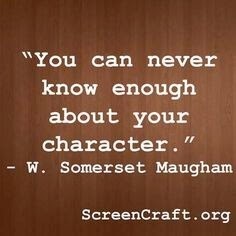
2) Know much more about your characters than you need to
Once I have a picture in my mind of who the character is, I work backwards to fill in the gaps, getting to know the character even better by exploring their background. There are lots of lists of questions available on the internet and in books designed to help authors explore their characters' backgrounds; I use the one below (You can right-click to expand it ... please feel free to use/modify it if it helps):
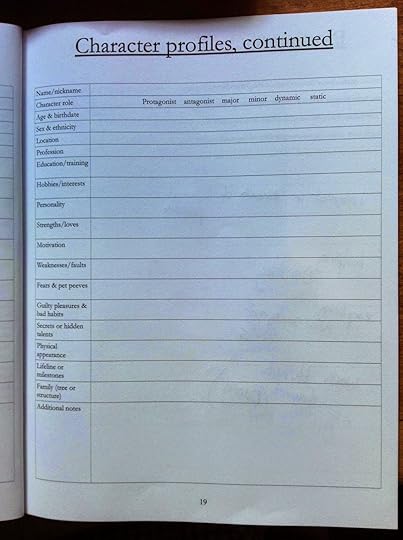
The purpose of this is not to make an exhaustive list of details that I'll include in a story, but so that when I finally get around to writing the story, I have such a clear picture of the character(s) that I'm writing about someone I know.
 This is close to what I'm talking about ... if you know the character well enough before you start writing, you don't have to include all of the details of their past to infuse your writing of them with the feel of their past.
This is close to what I'm talking about ... if you know the character well enough before you start writing, you don't have to include all of the details of their past to infuse your writing of them with the feel of their past.

3) Climb inside your characters for a ride, but let them drive
It takes me a while to get to know my characters, so I often take them out for a test-drive with a writing prompt or jump to a scene that I know they'll be easy to write in (and/or they'll have have fun with), in the story I'm planning.
By this point in our relationship, I can generally picture them quite easily, and hear their voice and tones when they engage in action or dialogue.
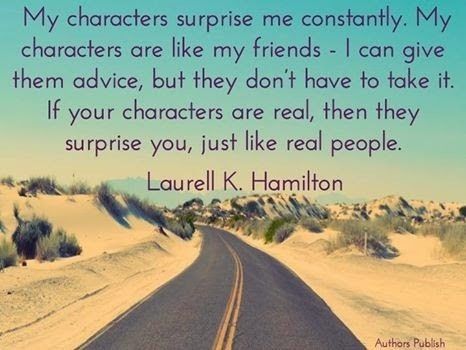
You know you're making progress when your characters surprise you. I always plan/map my stories out well ahead of time, but am forced to adjust the storyline in every one, when a major or minor character acts in ways that I hadn't envisioned when planning the story.
A great example of this in my writing is Barry, a minor character in my stories who died in my first novel, but surprised me by turning a cameo in my second novel into an ongoing and important character ... I was done with Barry, but he wasn't done with me.
If you have developed your characters properly, they should move beyond automatons, and become living and independent people in the world that you have built as a stage for your story ... when this happens, they'll surprise you (in a good way).
Good luck, have fun, and breathe life into your characters, then let them loose in the world!
Jamie

The characters in my stories are not me; if they were, I wouldn't be too interested in them, as I don't find myself very interesting. One of the things I love most about writing (and reading) is taking vacations from myself while wearing the personas of people not me for the duration of my experience with the various interesting/unusual characters one encounters in stories.
Writing compelling characters is important for writers, and their readers, because the characters in a story are the lens through which the action happens and rendered relevant. I have three tricks that I use to develop characters for my stories that people love and hate and wonder about and write letters to and ask me questions.

1) Build characters out of people you know and feel strongly about
Each of us knows hundreds, even thousands, of people; the ones you can make into characters in your stories are the ones whose names or pictures evoke the strongest response in you. They could be people you went to school with, friends of your parents or children, people you've seen on the news or in movies or read about in books ... for some reason, they grabbed, and continue to grab your attention.
When I start planning a story (be it novel or novella or short story), I think about the protagonist, and other major/minor characters, trying to picture them and who they are. I'll write a list of people that compose each character, like a list of ingredients in descending order of their prevalence in the character for my story (see an example below, with the primary 'ingredient' circled).
 Richard is a character in one of my stories, primarily composed/based on five people that I know/knew in real life or books or the news; Toph is circled because he's the main ingredient in my imagining of Richard.
Richard is a character in one of my stories, primarily composed/based on five people that I know/knew in real life or books or the news; Toph is circled because he's the main ingredient in my imagining of Richard.This method continues to work for me,yielding great places to start with characters who inhabit my stories because, and only because, I have strong feelings for, and familiarity with, the people/ingredients who are the constituent elements in my characters.

2) Know much more about your characters than you need to
Once I have a picture in my mind of who the character is, I work backwards to fill in the gaps, getting to know the character even better by exploring their background. There are lots of lists of questions available on the internet and in books designed to help authors explore their characters' backgrounds; I use the one below (You can right-click to expand it ... please feel free to use/modify it if it helps):

The purpose of this is not to make an exhaustive list of details that I'll include in a story, but so that when I finally get around to writing the story, I have such a clear picture of the character(s) that I'm writing about someone I know.
 This is close to what I'm talking about ... if you know the character well enough before you start writing, you don't have to include all of the details of their past to infuse your writing of them with the feel of their past.
This is close to what I'm talking about ... if you know the character well enough before you start writing, you don't have to include all of the details of their past to infuse your writing of them with the feel of their past.
3) Climb inside your characters for a ride, but let them drive
It takes me a while to get to know my characters, so I often take them out for a test-drive with a writing prompt or jump to a scene that I know they'll be easy to write in (and/or they'll have have fun with), in the story I'm planning.
By this point in our relationship, I can generally picture them quite easily, and hear their voice and tones when they engage in action or dialogue.

You know you're making progress when your characters surprise you. I always plan/map my stories out well ahead of time, but am forced to adjust the storyline in every one, when a major or minor character acts in ways that I hadn't envisioned when planning the story.
A great example of this in my writing is Barry, a minor character in my stories who died in my first novel, but surprised me by turning a cameo in my second novel into an ongoing and important character ... I was done with Barry, but he wasn't done with me.
If you have developed your characters properly, they should move beyond automatons, and become living and independent people in the world that you have built as a stage for your story ... when this happens, they'll surprise you (in a good way).
Good luck, have fun, and breathe life into your characters, then let them loose in the world!
Jamie
Published on October 26, 2014 03:17
October 21, 2014
6 time-tested tips to "WINNING" NaNoWriMo this year (and every year)
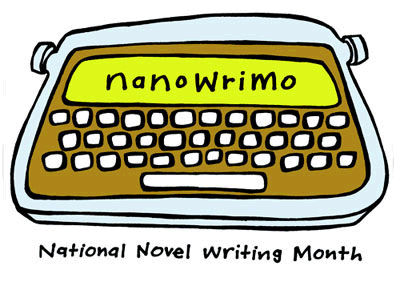
At this time of year, I start seeing posts and updates and articles mentioning NaNoWriMo, which stands for National Novel Writing Month ... the idea is to write a novel in a month!
The concept is incredible, but as crazy as it sounds, it's possible to do it ... I've tried and "won" (finished a first draft before the end of the month) the last three years, and the purpose of this blog is to share my top five tips so you can do the same thing.


1) Fully commit to the process and jump in the deep end before giving yourself a chance to think too much
Tell your family and friends that you will be participating in NaNoWriMo, and explain the process to them. They may think you're crazy, and that it's impossible (and they might even be right), but many of them will be supportive and ask how they can help.
Sign up on the NaNoWriMo website as soon as you can. Don't worry if your title and synopsis and other details aren't set in stone; the important thing is to shout your intention to write a novel to the heavens.
Now is the time to decide when/where in your life you can carve out a couple of hours a day for the month you'll be NaNoWriMo-ing ... for a month, you can live without some combination of the stuff that makes up your normal life if it means writing your novel.
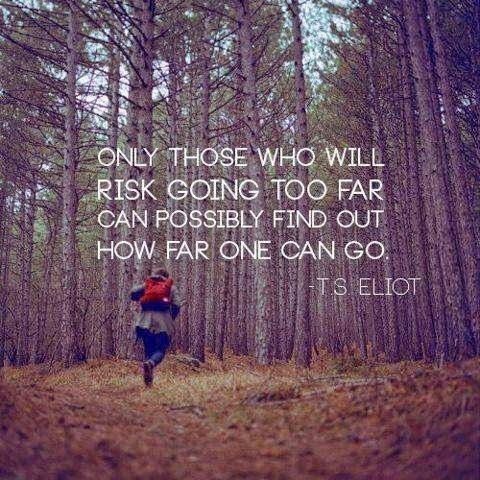
Give yourself permission to ask for help and time and absolution from some of your regular responsibilities at home and work ... you'd be surprised at how many people will give you a hand with other things to leave you more time/energy to focus on your writing (especially when they know it's just for a month).
Fully committing to the process was magic for me, and my writing. I'd always dreamed of writing a novel, but never made the space in my life for it. I was hooked the second I heard about NaNoWriMo, knowing that it would be the only way I'd ever get my novel written.
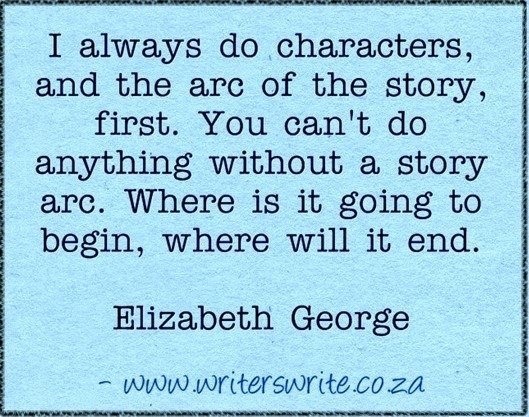
2) Know the story, characters, and setting ahead of time ... make a plan
I can't stress the importance of pre-writing enough; it was the key to my three-time success at NaNoWriMo. There are lots of people who take pride in being a "pantser" (someone who writes by the seat of their pants), and I will tell you that I hear lots more of them talking about their novels at the beginning of the month than at the end.
I like to start the planning months ahead, with notes and memos to myself, but only get serious about mapping out characters and the story arc in the month leading up to NaNoWriMo.

I get to know all of my main and secondary characters, writing down details of their lives, key motivational drives, and stuff about where they live as an opening exercise; I do this in a composition notebook or similar
The arc of the story is next ... I like to know where the story begins, where it ends, what the main (and secondary) conflicts will be (and how they'll be played out; I map this part out on a big sheet (or sheets) of construction paper.
Having a plan, even as simple as a what I've outlined above, gets me thinking about how the story will both start and play out. I think of these steps more as a general map than a recipe ... the guideposts along the way give me form, but also allow me to wander where the story wants to take me.
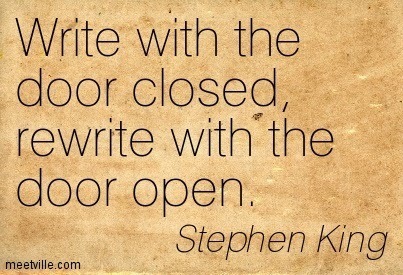
3) Set up your working environment & conditions to maximize efficiency and minimize distractions
Stephen King knows of what he speaks. You need to set up your NaNoWriMo time and space so as to give yourself privacy and quiet and space.
You should be writing in a place that is physically comfortable for you, and as distraction-free as you can manage.
Beyond that, you need to try and close the door on the rest of your life and relationships for the hours each day that you're writing for NaNoWriMo. Leave work and family matters on the other side of the door; at the end of your writing sessions, leave the story in the writing space (you'll be tempted to share details about the story ... resist, and instead keep your fans/supporters updated with generalities).
I like quiet classical music, Stephen King likes loud hard rock, you may like something in between or something entirely different. I alternate between writing at the kitchen table and at a standing desk, depending on my mood, the angle of the sun through the windows, and whatever else is going on in the house ... the important thing is to acknowledge what works for you and set up those conditions.
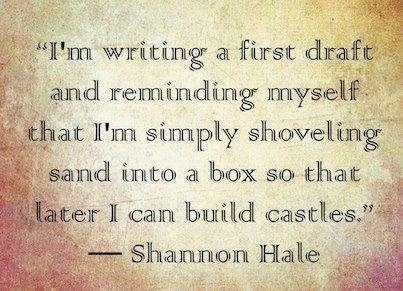
4) Tell your story, trust the process, JUST WRITE, don't edit
The important thing with NaNoWriMo, more than with any other writing process/project you've experienced before, is to find a way to start writing everyday, and get a couple of thousand words down before you stop.
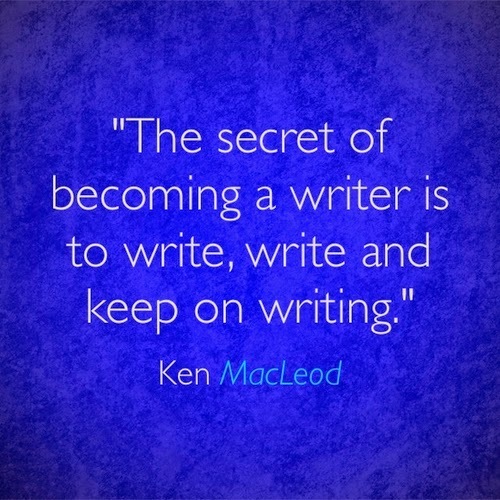
The NaNoWriMo goal of 50,000 words works out to 1667 words per day, if you write every day during the month; I have never been able (or willing) to write every single day, so I aim for 2,500 words, so that if I miss a day I don't feel horrible/defeated.
My three years of NaNoWriMo, I have ended up writing 75,000, 90,000, and 85,000 words for my first drafts ... if the day is going well, I don't mind running through my goals and have produced as much as 7,500 words during a marathon writing day.
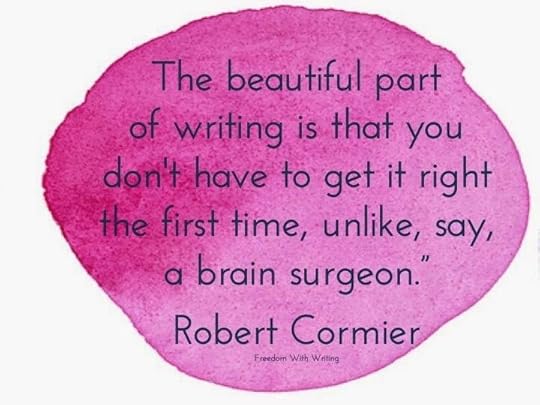
This is what you have to keep telling yourself, especially when you get tempted to go back and fix something that you wrote the day before ... if I really can't get a fix out of my head, I'll either go back (if I know that it's the kind of thing I can change in a couple of minutes), or write my thoughts about it down on the back page of whatever notebook I'm working out of currently.

You will find, as you get immersed in the month-long writing process, that your writing becomes easier and faster, and that the 1667 words per day that once seemed so imposing has become an easy morning's work for you ... enjoy it while you can, some days it will still be tough to get going, so it's nice to have a cushion of words.
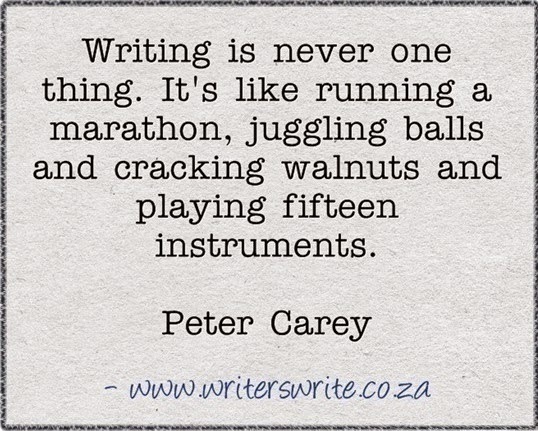
4a) Don't you dare upnplug during NaNoWriMo
Lots of writers will tell you to unplug completely while writing your NaNoWriMo novel ... I couldn't disagree with them more.
I send emails to friends and family during breaks with updates, sometimes begging off from dinner or pickup from camp. I always have 6-8 browser windows open on my laptop, so that I can access maps and facts and do some just-in-time research and look up moon and tide cycles and historical weather data and number nerdery. I recently posted a blog describing my favorite apps to use while writing, and often have my iphone playing music, while I'm working on two or more things on the ipad, and a bunch of windows vying for my attention on the laptop ... without my tech, all of my writing would take much longer, and being able to access it on the fly makes my NaNoWriMo work.

5) Have appropriate food and fuel ready and waiting for you, for both snacks and breaks
Writer often joke about our coffee addictions, but the truth is that I have a much easier time writing, especially for NaNoWriMo, if I'm gently wired on coffee; too much, and I become jittery and the writing gets harder again, so it is really a matter of finding the correct balance.

I also always keep a glass of cold water at hand, so I don't dehydrate, and sometimes switch Coke for coffee if the weather is warm enough that I think of it.
I've found that I can't write if I'm starving or stuffed, so during NaNoWriMo I work to stay in the sweet spot as much as is possible. I also like to avoid foods that are slow or messy, either to prepare or eat or clean up. I end up making/eating a lot of GORP (a mix of dried fruits and nuts, sometimes with jerky in it, or on the side), along with apples, bananas, hard-boiled eggs, and pasta from the night before during my writing days.
I always have food and drink next to me while I'm writing, and also make myself walk away from my writing to take a 20 minute 'lunch' break every three hours or so ... I find that getting away from the story for a bit every once in while helps keep me writing longer.
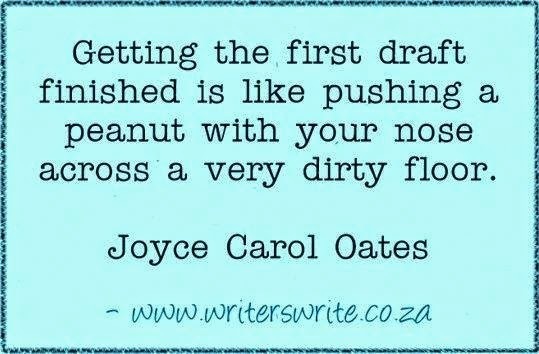
6) Feel free to skip chunks that don't come easily, you will have to fix it later anyway
One of the issues that I struggled with during my first NaNoWriMo was continuity of story and writing, while still maintaining forward momentum and my daily word-count numbers. I would be having difficulty writing a scene or some dialogue, and derail my writing flow/speed.
What I learned with time and practice was that I ended up with better results when running into this sort of trouble if I just wrote something like, "THIS SECTION NEEDS WORK!", and moved on to whatever was next in the story.
It felt like cheating the first few times I did it, but you end up having to chop and graft and prune and add so much to every piece of the story that it's really better to skip the tough part and come back to it later (either in the editing stage, or sometimes the fix would come to me during the night, and I could add it in the next morning).
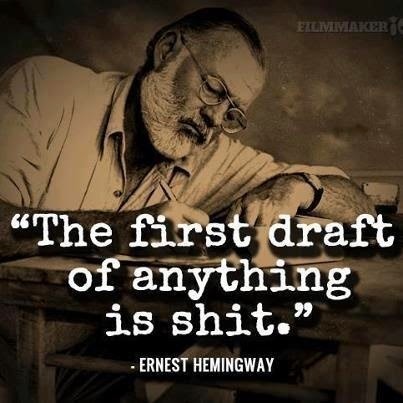
Keep repeating this to yourself the whole time you're writing your NaNoWriMo novel ... that way if you have some gems mixed in with the crap, you'll have convinced yourself that you're a genius. The most important thing is to get the framework of the story out and onto the screen or paper, so that you can take it to the next level with your beta reader and editors.

One of the things that I love about NaNoWriMo, besides that it has helped me become a writer (which is a pretty big deal in and of itself), is that everyone who crosses the 50,000 word line can consider themselves a 'winner'. By any measure, a person who completes the first draft of their novel has won, because it changes your world forever.

Another fantastic thing about NaNoWriMo is that it forces you to rush headlong into a process that far too many people think far too much about before, or while, they do it ... writing.
The forced march of writing thousands of words each day for a month is a form madness with a spectacular method behind it ... it forces you to put your self-consciousness aside, to think less and write more (which is always good for your writing).
If you have laid the groundwork in your planning and preparations, have the environment and sustenance taken care of, have the support of friends and family, give yourself permission to write whatever comes, and skip what needs skipping the first time around, you'll have a pretty good chance fo being successful at NaNoWriMo this year ... and every year.

Published on October 21, 2014 02:30
October 17, 2014
5 things to look for in (and love about) an awesome beta reader!
What's a beta reader, and why do I need one?
Writing a novel is fun and scary and stressful and wonderful and nervous-making and exciting!
At the end of the process, whether you wrote the thing in a month (ala NaNoWriMo) or over the course of a decade, you will have a first draft of something that is solely the product of your brain ... it's your offspring.
The most important thing you can remember at that point is:
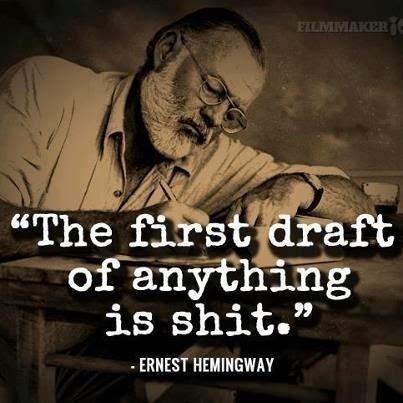
The sad, harsh, demoralizing, and anxiety-inducing truth is that nobody writes good stuff the first time around (my understanding is that Kurt Vonnegut worked on each page until it was perfect, and then shipped them all to his publisher for printing ... but let's face it, we're none of us Kurt Vonnegut, except for Kurt himself, of course).
You translated a mess of ideas and plans and whims and questions into a story, and it shouldn't come as a surprise to you, or anyone, that it won't come out right the first time. You need to fix it, and you need help.
You need someone (or a bunch of someones) to help for a number of reasons:you're too close ... to the story and even the words on the pageyou'll have trouble seeing what you're missing, what you have too much of, and what just sucksyou can't look at the story with a stranger's eyes, and take it in with a brain unused to the characters and conflictyour style and grammar and syntax may work for you, but be troubling for everyone elseit's possible (easy, even) to know too much about the story and leave out important details or scenes or characters This is where your beta reader comes in
A beta reader reads a written work of fiction, often a first/rough draft, with an eye to readability, believability, plot (and plot-holes), conflict, continuity, characters, and setting. A beta reader generally shouldn't concern themselves with spelling or grammar, unless there are such grievous problems that they affect the readability of the story.

Your beta reader will be the first set (or sets) of eyes on your writing, which will likely initially be uncomfortable and leave you feeling tremendously exposed (and possibly defensive); for that reason, and because of my belief that the importance of a functional/healthy relationship with your beta readers can't be overstated, I'm going to share my thoughts some traits to look for and foster in a beta reader, and your relationship with your beta reader.
Some my advice/thoughts/commentary on the role and function of the beta reader will differ from what can be found elsewhere, and all I can say to that is that I've successfully published two novels (and am most of the way done with my third) and a quartet of novellas, and feel strongly that none of it could have (would have) happened without my beta reader.
1) You have to know and trust and respect your beta reader
As I mentioned above, giving your rough draft to the beta is an extreme act of trust and bravery; exposing yourself, your work, your mind, to their critical eye will only really work if you have a pre-existing relationship with them that is based on trust and respect.
{a caveat to this rule is that the beat reader should not be the person you brainstormed the story with before writing it ... they need to come to it with as little foreknowledge as is possible}
2) Your beta reader must be an accomplished and voracious reader in the same genre as your book
The most important job your beta reader does is to tell you what 'works' and what doesn't in your rough draft; this can only be valuable if they read enough books (and books within your target genre) to know what 'works', what doesn't, and why.
3) Your beta reader needs to understand the elements of good writing and good books, and more importantly, the difference between the two
A beta reader should be able to determine if you've followed the basic rules of writing, and to tell you if poor writing gets in the way of the story; more important, though, they should have a good understanding of the arc of a story, effective use of conflict and characters and pacing and setting and voice and tone and dialogue.
4) Your beta reader should have, and be able to form and share, opinions about books and writing ... and do it without hosing you down with unnecessary negativity or praise
They should know how they feel about your book and be able to say it in a way that helps you figure out how to improve your writing; a beta reader too gleeful (or apologetic) about their criticism won't help you take your book from first draft to publication, and at the end of the day, that's their job.
5) Your beta reader understands their job, their role in your writing process, and is willing to put in the time and effort to help you get your story to the next stage
The beta reader is not your editor ... that comes later. They serve as a first set of eyes on your newly minted work of fiction with an eye to readability, believability, plot (and plot-holes), conflict, continuity, characters, and setting.
They should expect to read the book twice (once to get a general feeling, and a second time to make notes about issues/questions), be comfortable with the terms used to describe/critique fiction, and be conversant in what makes a book (or parts of a book) great ... or awful.
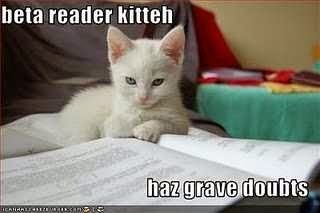
Yup, got it, but what does that all mean?
Basically this means that they should read your book to see if it 'works' for them; a beta reader that points out specific things that they liked or didn't like about the book and/or how you wrote it is much more useful than one who gives you highly general comments:
Examples: Helpful - "I loved the consistency of voice/feel in the protagonist, but didn't feel that there were enough significant obstacles in the story before the conflict was resolved ... the part around his solving the mystery and breaking the code felt too easy and neat to me."Less Helpful - "The characters were awesome, but the plot was 'meh' and then done."
Besides a list of 'big picture' comments about what they liked and didn't like about your book (and why), your beta reader should bring a list of questions that they have about the book, plot, conflict, characters, setting, and scenes; they may feel that you need to know more about some things than you gave in the first draft, and want other things cut or streamlined to reduce static in the storyline.
It's generally much more helpful for a beta reader to tell the writer what the problems (and highpoints) of a book are (and why, with details), than to offer prescriptive solutions.
In a perfect world, your beta reader will be willing to take a look at the book again after you've finished working on their suggested edits, to see if your changes made the necessary difference to the first draft.
How do you find this mythical beast, the perfect beta reader?
You probably don't ....
In most cases, you'll be able to find someone who meets some, but not all, of the criteria outlined above; make sure you take their potential shortcomings into account when planning the edits of your novel.
Lots of people work around this issue by lining up multiple beta readers ... I don't, now let me tell you why.
My wife is my beta reader. We've set up a system so that we're both comfortable with the exchange of ideas and process surrounding our joint work on whatever my current writing project is. She's an enthusiastic reader and gives honest/balanced critiques of my work, never overstepping or apologizing for her thoughts/questions about my stories. Over the years, we've worked out a method for going through my books, scene by scene and also looking at the arc of the story; it gets better with each book that we work together on.
I am loathe to mess with a system that's working, but I've been thinking of adding another beta reader (or three) to the mix. I won't do it for the novel that we're currently working on, but am in the process of writing a lengthy piece of serial fiction that might benefit from additional sets of eyes during the formative stages (and since it's something completely new to me/us, it won't feel so alien to add more readers to the early stages).
My final thoughts on beta readers
Having written numerous novels and novellas, and seen the difference between first draft and finished product, I can tell you in no uncertain terms that having an excellent beta reader is vitally important to your writing.
I have good ideas, and get about 60 to 70 percent of them out in my first drafts ... without a great beta reader that I trust completely, my stories might never get past that stage.
With my wife's help, I am able to flesh out my ideas more fully, pruning and grafting where needed to improve the ideas and delivery and emotional impact; I can produce more effective writing.
Writing a novel is fun and scary and stressful and wonderful and nervous-making and exciting!
At the end of the process, whether you wrote the thing in a month (ala NaNoWriMo) or over the course of a decade, you will have a first draft of something that is solely the product of your brain ... it's your offspring.
The most important thing you can remember at that point is:

The sad, harsh, demoralizing, and anxiety-inducing truth is that nobody writes good stuff the first time around (my understanding is that Kurt Vonnegut worked on each page until it was perfect, and then shipped them all to his publisher for printing ... but let's face it, we're none of us Kurt Vonnegut, except for Kurt himself, of course).
You translated a mess of ideas and plans and whims and questions into a story, and it shouldn't come as a surprise to you, or anyone, that it won't come out right the first time. You need to fix it, and you need help.
You need someone (or a bunch of someones) to help for a number of reasons:you're too close ... to the story and even the words on the pageyou'll have trouble seeing what you're missing, what you have too much of, and what just sucksyou can't look at the story with a stranger's eyes, and take it in with a brain unused to the characters and conflictyour style and grammar and syntax may work for you, but be troubling for everyone elseit's possible (easy, even) to know too much about the story and leave out important details or scenes or characters This is where your beta reader comes in
A beta reader reads a written work of fiction, often a first/rough draft, with an eye to readability, believability, plot (and plot-holes), conflict, continuity, characters, and setting. A beta reader generally shouldn't concern themselves with spelling or grammar, unless there are such grievous problems that they affect the readability of the story.

Your beta reader will be the first set (or sets) of eyes on your writing, which will likely initially be uncomfortable and leave you feeling tremendously exposed (and possibly defensive); for that reason, and because of my belief that the importance of a functional/healthy relationship with your beta readers can't be overstated, I'm going to share my thoughts some traits to look for and foster in a beta reader, and your relationship with your beta reader.
Some my advice/thoughts/commentary on the role and function of the beta reader will differ from what can be found elsewhere, and all I can say to that is that I've successfully published two novels (and am most of the way done with my third) and a quartet of novellas, and feel strongly that none of it could have (would have) happened without my beta reader.
1) You have to know and trust and respect your beta reader
As I mentioned above, giving your rough draft to the beta is an extreme act of trust and bravery; exposing yourself, your work, your mind, to their critical eye will only really work if you have a pre-existing relationship with them that is based on trust and respect.
{a caveat to this rule is that the beat reader should not be the person you brainstormed the story with before writing it ... they need to come to it with as little foreknowledge as is possible}
2) Your beta reader must be an accomplished and voracious reader in the same genre as your book
The most important job your beta reader does is to tell you what 'works' and what doesn't in your rough draft; this can only be valuable if they read enough books (and books within your target genre) to know what 'works', what doesn't, and why.
3) Your beta reader needs to understand the elements of good writing and good books, and more importantly, the difference between the two
A beta reader should be able to determine if you've followed the basic rules of writing, and to tell you if poor writing gets in the way of the story; more important, though, they should have a good understanding of the arc of a story, effective use of conflict and characters and pacing and setting and voice and tone and dialogue.
4) Your beta reader should have, and be able to form and share, opinions about books and writing ... and do it without hosing you down with unnecessary negativity or praise
They should know how they feel about your book and be able to say it in a way that helps you figure out how to improve your writing; a beta reader too gleeful (or apologetic) about their criticism won't help you take your book from first draft to publication, and at the end of the day, that's their job.
5) Your beta reader understands their job, their role in your writing process, and is willing to put in the time and effort to help you get your story to the next stage
The beta reader is not your editor ... that comes later. They serve as a first set of eyes on your newly minted work of fiction with an eye to readability, believability, plot (and plot-holes), conflict, continuity, characters, and setting.
They should expect to read the book twice (once to get a general feeling, and a second time to make notes about issues/questions), be comfortable with the terms used to describe/critique fiction, and be conversant in what makes a book (or parts of a book) great ... or awful.

Yup, got it, but what does that all mean?
Basically this means that they should read your book to see if it 'works' for them; a beta reader that points out specific things that they liked or didn't like about the book and/or how you wrote it is much more useful than one who gives you highly general comments:
Examples: Helpful - "I loved the consistency of voice/feel in the protagonist, but didn't feel that there were enough significant obstacles in the story before the conflict was resolved ... the part around his solving the mystery and breaking the code felt too easy and neat to me."Less Helpful - "The characters were awesome, but the plot was 'meh' and then done."
Besides a list of 'big picture' comments about what they liked and didn't like about your book (and why), your beta reader should bring a list of questions that they have about the book, plot, conflict, characters, setting, and scenes; they may feel that you need to know more about some things than you gave in the first draft, and want other things cut or streamlined to reduce static in the storyline.
It's generally much more helpful for a beta reader to tell the writer what the problems (and highpoints) of a book are (and why, with details), than to offer prescriptive solutions.
In a perfect world, your beta reader will be willing to take a look at the book again after you've finished working on their suggested edits, to see if your changes made the necessary difference to the first draft.
How do you find this mythical beast, the perfect beta reader?
You probably don't ....
In most cases, you'll be able to find someone who meets some, but not all, of the criteria outlined above; make sure you take their potential shortcomings into account when planning the edits of your novel.
Lots of people work around this issue by lining up multiple beta readers ... I don't, now let me tell you why.
My wife is my beta reader. We've set up a system so that we're both comfortable with the exchange of ideas and process surrounding our joint work on whatever my current writing project is. She's an enthusiastic reader and gives honest/balanced critiques of my work, never overstepping or apologizing for her thoughts/questions about my stories. Over the years, we've worked out a method for going through my books, scene by scene and also looking at the arc of the story; it gets better with each book that we work together on.
I am loathe to mess with a system that's working, but I've been thinking of adding another beta reader (or three) to the mix. I won't do it for the novel that we're currently working on, but am in the process of writing a lengthy piece of serial fiction that might benefit from additional sets of eyes during the formative stages (and since it's something completely new to me/us, it won't feel so alien to add more readers to the early stages).
My final thoughts on beta readers
Having written numerous novels and novellas, and seen the difference between first draft and finished product, I can tell you in no uncertain terms that having an excellent beta reader is vitally important to your writing.
I have good ideas, and get about 60 to 70 percent of them out in my first drafts ... without a great beta reader that I trust completely, my stories might never get past that stage.
With my wife's help, I am able to flesh out my ideas more fully, pruning and grafting where needed to improve the ideas and delivery and emotional impact; I can produce more effective writing.
Published on October 17, 2014 05:36
October 14, 2014
15 IOS Apps That are Priceless to My Writing Process
I do most of my writing on a laptop (a Chromebook, if that's of interest), but I use a number of apps throughout my writing process.
As always, let me point out that what works for me may not work for you ... but it may give you a starting place, or an idea, or simply to cross-off something you've been thinking about for a while.

Pages - The app I use for taking notes with my iPad; it's a robust word processor that allows for simple sharing and storage. I don't like typing lengthy pieces of work on my iPad, but when working up ideas for writing projects, it's perfect.
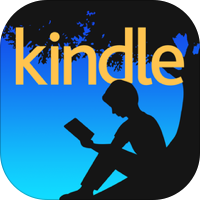
Kindle - I use the kindle app to ... wait for it ... host and read books. A big part of a writer's job is to read, and the Kindle app is wonderful for that; it also allows me to search through my earlier books for specific words or names or places, much more quickly than flipping pages.

Google Maps - Although I tend to have a pretty good idea of the places and spaces through which my characters move during the course of my stories, I love being able to check directions and distances and relationships between places and objects with this superb mapping app.

Sunset & Sunrise - My characters and I like knowing when the sun rises and sets in different places, and this is a wonderful resource that allows us to do just that ... I also have two that help me with the phases of the moon and the tides, but that's too nerdy to admit, so I'll pretend this is the only one I use.


 Netflix and Amazon Instant Video and HuluPlus all come in handy once in a while, when I refer to a TV show or a movie in my writing, and want to make sure that I have the quote or scene or characters or action reference correct.
Netflix and Amazon Instant Video and HuluPlus all come in handy once in a while, when I refer to a TV show or a movie in my writing, and want to make sure that I have the quote or scene or characters or action reference correct.

Pandora internet radio is great for picking/playing music while you write. I always write to music, and it's almost always instrumental classical music (no singing, and no hard edges to the music). I tend towards Mozart and Bach, but have gotten lucky quite often letting Pandora take me where it will.

Voice Recorder is my favorite of the numerous voice recording apps that I've tried. I wanted a simple interface that I could operate easily with my iPhone and sausage-fingers while driving (I get lots of ideas while on the road); it also arranges the files in a logical manner that works for me.

Camera+ is an easy to use camera app, that offers a little more control than the basic camera that comes standard with my iPad and iPhone. I like taking photos of places and people and buildings and documents, for later use in my writing, and this app makes it easy to do.

 Wikinodes and WikiLinks are wonderful research tools that deliberately shows the linkages between subjects in a visual web of informational nodes. I love starting on one subject, and seeing where following the info-nodes takes me.
Wikinodes and WikiLinks are wonderful research tools that deliberately shows the linkages between subjects in a visual web of informational nodes. I love starting on one subject, and seeing where following the info-nodes takes me.

Date & Time Calculator is a useful tool for figuring out all manner of conversions in dates and times. I find the need for this in every writing project, and this app makes it much easier than ether googling or using pen and paper.

Pomodoro Tmer is a fantastic, and infinitely configurable timer, based on a proven productivity research for maximizing efficiency to help you beat procrastination in long-term projects like writing.

Writer Lists is a treasure trove of lists of information that can help a writer with all sorts of details for their writing: character names, physical traits, occupations, milestones, and personality; plot, setting, genres, along with a ton of other information useful to writers ... all gathered in one place.
I'm certain that there are other ways to get the stuff done that I am able to do with the help of these 13 apps, but having them loaded onto my iPad and iPhone make my life, and job as a writer, that much easier, and leave more of my brain available for thinking about writing stories.
Thanks,
Jamie
As always, let me point out that what works for me may not work for you ... but it may give you a starting place, or an idea, or simply to cross-off something you've been thinking about for a while.

Pages - The app I use for taking notes with my iPad; it's a robust word processor that allows for simple sharing and storage. I don't like typing lengthy pieces of work on my iPad, but when working up ideas for writing projects, it's perfect.

Kindle - I use the kindle app to ... wait for it ... host and read books. A big part of a writer's job is to read, and the Kindle app is wonderful for that; it also allows me to search through my earlier books for specific words or names or places, much more quickly than flipping pages.

Google Maps - Although I tend to have a pretty good idea of the places and spaces through which my characters move during the course of my stories, I love being able to check directions and distances and relationships between places and objects with this superb mapping app.

Sunset & Sunrise - My characters and I like knowing when the sun rises and sets in different places, and this is a wonderful resource that allows us to do just that ... I also have two that help me with the phases of the moon and the tides, but that's too nerdy to admit, so I'll pretend this is the only one I use.


 Netflix and Amazon Instant Video and HuluPlus all come in handy once in a while, when I refer to a TV show or a movie in my writing, and want to make sure that I have the quote or scene or characters or action reference correct.
Netflix and Amazon Instant Video and HuluPlus all come in handy once in a while, when I refer to a TV show or a movie in my writing, and want to make sure that I have the quote or scene or characters or action reference correct. 
Pandora internet radio is great for picking/playing music while you write. I always write to music, and it's almost always instrumental classical music (no singing, and no hard edges to the music). I tend towards Mozart and Bach, but have gotten lucky quite often letting Pandora take me where it will.

Voice Recorder is my favorite of the numerous voice recording apps that I've tried. I wanted a simple interface that I could operate easily with my iPhone and sausage-fingers while driving (I get lots of ideas while on the road); it also arranges the files in a logical manner that works for me.

Camera+ is an easy to use camera app, that offers a little more control than the basic camera that comes standard with my iPad and iPhone. I like taking photos of places and people and buildings and documents, for later use in my writing, and this app makes it easy to do.

 Wikinodes and WikiLinks are wonderful research tools that deliberately shows the linkages between subjects in a visual web of informational nodes. I love starting on one subject, and seeing where following the info-nodes takes me.
Wikinodes and WikiLinks are wonderful research tools that deliberately shows the linkages between subjects in a visual web of informational nodes. I love starting on one subject, and seeing where following the info-nodes takes me.
Date & Time Calculator is a useful tool for figuring out all manner of conversions in dates and times. I find the need for this in every writing project, and this app makes it much easier than ether googling or using pen and paper.

Pomodoro Tmer is a fantastic, and infinitely configurable timer, based on a proven productivity research for maximizing efficiency to help you beat procrastination in long-term projects like writing.

Writer Lists is a treasure trove of lists of information that can help a writer with all sorts of details for their writing: character names, physical traits, occupations, milestones, and personality; plot, setting, genres, along with a ton of other information useful to writers ... all gathered in one place.
I'm certain that there are other ways to get the stuff done that I am able to do with the help of these 13 apps, but having them loaded onto my iPad and iPhone make my life, and job as a writer, that much easier, and leave more of my brain available for thinking about writing stories.
Thanks,
Jamie
Published on October 14, 2014 06:00
October 9, 2014
4 Tips to Improve the Feeling of Place in Your Writing
 (I love this quote, and couldn't agree with Eudora more)
(I love this quote, and couldn't agree with Eudora more)My books are set in the Adirondack Park, and more specifically the Tri-Lakes area (including, for those interested, Saranac Lake, Tupper Lake, and Lake Placid); this place is important to me as a person and as a writer.
Numerous readers and reviewers have commented that the feeling of place in my stories almost makes it seem another character; this isn't anything I do intentionally, it's just an outgrowth of the pre-planning activities I indulge/engage in before I begin writing.
Having a clear picture of the place, or places, that my stories and characters will inhabit makes it much easier for me to write; the sense of place gives me something to hang the stories on.

Although in a writer's lexicon, setting includes time as well as physical location, let's talk about setting in terms of simply the location for a moment (since my books deal exclusively with the present, or very recent past).
The setting of your story provides the environment through which your characters and plot and conflict move and advance; if those other elements are well-seated in the setting, as in the diamond ring above, then your story has a much greater chance of success, and not falling out and getting lost (to truly abuse the metaphor).
There are four things that I do before, and while, writing every story that help to establish the story's setting, most especially in terms of the feeling/sense of place, which will provide a solid foundation upon which to build the rest of your story (think of them as the four prongs of the setting above).
I'll explain them below through the lens of a recent series of pre-writing exercises that I engaged in while preparing to start a piece of serial fiction I'm hoping to start the release of in January.
1) Site Visits: I've lived in, and explored, the Adirondacks for more than forty years, and am generally very familiar with the places that I write about, but I always take the time for site visits as early as possible in my pre-writing process (and then again as needed while writing).
Memories and drive-bys aren't enough for me, I need to get out and tromp around. The physical act of exploring a place that I want to include in a story helps my brain start doing the proper things needed to include details in the upcoming writing.
 (I recently too a site visit to an abandoned apple orchard that the forest is slowly reclaiming ...
(I recently too a site visit to an abandoned apple orchard that the forest is slowly reclaiming ... we got there early enough in the day for some lingering fog and dew on everything)
2) Sensory Exploration/Immersion: An important part of the experience for me is to find a way to experience the location using as many of my senses as I can easily (safely?) manage.
I like to feel the cold or hot on my skin, rub a finger along the bark or moss or glacial erratics and sit or roll around on the ground; to listen to the birds and beasts and bugs and the wind in the trees or grass; to stop frequently to breathe deep in the smells native to each place and reflect on why it smells that way; to look for colors, muted or bright, shadows, deep and dark or tiny, and shapes, tall and thin or squat and round or spooky or comforting ... I was going to say that I don't taste things in the places I visit before writing, but I do; the sharp/sweet taste of tiny unripe apples, the acrid grassy taste of cool moss plucked off of a boulder, the clean dirt taste of old twigs.
All of these things help me to build a feeling for the place, and eventually will make it easier to include it in my writing.
 (I took this while exploring an area that my homeless protagonist lives in ... the morning fog and cold and feel and sound of the woods is all captured quite nicely in this picture)
(I took this while exploring an area that my homeless protagonist lives in ... the morning fog and cold and feel and sound of the woods is all captured quite nicely in this picture)3) The Buddy System: Whenever possible, I like to bring someone else along with me on my explorations, and talk with them about what we see and do while out in the field. They'll often see things that I miss, but even if they don't, we are bound to experience the place differently, and those differences are useful to me when taking notes after the fact.
When I visited the orchard with my son, he was drawn to the still mostly-open fields, while I was focused on the tree-shaded areas ... it provided a nice balance, and eventually helped me re-think some of my assumptions about wild places and open space and the edges of the places mankind tames and then lets go again.
 (My son, Ben, came along with me on the site visit to the old orchard ... seeing it through his eyes, and hearing about it through description to my wife, was invaluable)
(My son, Ben, came along with me on the site visit to the old orchard ... seeing it through his eyes, and hearing about it through description to my wife, was invaluable)4) Aids to Recall and Writing: Clearly I take pictures on these field trips, but beyond simple recording, I try to capture images that will remind me of what it felt like to walk in those places.

There were a number of signs of long-ago farming in and around the old orchard, this milk jug among them (also some strands of barbwire fencing grown inches into large trees, stone walls enclosing ancient pasture lands, and so on).

Spider webs were everywhere, highlighted by dew and the sunshine coming in at a low angle ... I'm sure they're always there, but they felt even more present on that morning.

I'm a big fan of glacial erratics, and my protagonist will be living in a shelter built against this one at the edge of the orchard.
Beyond these, and other, photographs, I recorded some audio of the wind going through the leaves of trees and blades of grass at different points along our exploratory path through and around the abandoned orchard. I also took a small apple from one of the trees, and a tiny shard of mossy rock from an old stone wall. I wrote down a quick set of notes as soon as I got home ... my impressions of our walk in the woods and orchard and overgrown fields in the backcountry.
These things, taken as a whole, provide a powerful set of stimuli that make it easier for me to picture, and understand, and write about, this place; I get them out and take advantage of the recall they bring either before or during my writing time.
Some of these steps may be overkill, but none of them take much time or effort, so I'm content to make the investment; so far, it's been working for me in writing stories with a rich sense of place.
Remember:

This sounds a bit trite, but is true nonetheless ... if you can paint a nice picture of a place with your writing, your reader will have an easier time with their suspension of disbelief and enjoy your story that much more.

As a result of following these four tips in establishing a feeling of place for my upcoming serial fiction project, I was able to create this cover image, which feels about right to me, based on the place I visited and hold in my head. I may alter the cover somewhat before publication, but this is pretty close to what I picture in my head.
Thanks,
Jamie
Published on October 09, 2014 07:37



